
views
Identifying Your Values

Evaluate your life. When you know what you value in life, in other words, what things make you happy, you can make decisions that allow you to have those things in your life. Look at your life up to this point and think about what has made you happy in the past and what makes you happy now. Start a journal or make a list of things that pop up in your life on a regular basis. Include people and places that you visit or interact with regularly. Also list material things and experiences that have significance. For example, you might write that you: spend time with your best friend weekly; attend art class; have Sunday brunch with your dad; buy new shoes monthly; paint at least an hour a day; etc. Think about the big things (like getting a promotion) and the small things (like seeing a rainbow) that you enjoy. Think about things you enjoyed as a child, as well as things you like now. For instance, you might write that some of your best memories are of your family traveling on vacations.
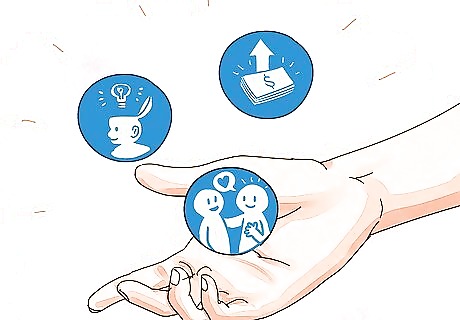
Decide what’s important. Knowing what makes you happy will make it easier for you to do things that make you happy. Examine your list and look for patterns or common themes in what you have listed. Those are things that are important to you, your values. Knowing what your values are will help you know what to include in your plan for your future happiness. For example, if you have on your list that you attend art class and paint outside of class, then that would be a pattern. You might say you value creativity. Or, for example, spending time with family and friends a lot might suggest that you value relationships and connecting with people. You might see patterns that indicate you value financial independence, learning, or helping others. If it helps you keep track of your values, make another list of just the values or themes you find from your master list.
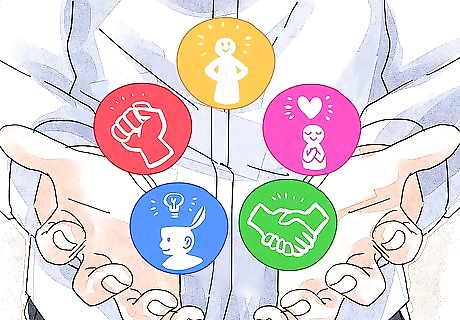
Prioritize your values. When you are planning for your future happiness it helps to know what your values are. Once you’ve figured that out, you can determine which values are most important to you. Prioritizing your values will help you organize your plan for your future happiness. You will know which areas are most important for you to work on. Try numbering each of your values in order of importance until each value has a number. If you need help prioritizing your values, you can ask yourself could you be happy without that value. Or, how happy could you be without that value? For example, if you could have everything else in the world, but still couldn’t be happy without your family and friends around, relationships might be your top value. When you are creating your plan, focus on those values that have the highest priority to you.
Developing a Happy Mindset

Believe in yourself. If you have a positive perspective on life you may find it easier to plan for your future happiness. Some research suggests that self-efficacy, or believing in yourself, is connected to planning for future happiness. If you have faith that you can be happy now and in the future, you may do things to try to be happy. This will make it more likely that you will actually have future happiness. Believe that you can succeed in general. Remind yourself, “I can do what I set my mind to. I can succeed and I believe in myself.” Tell yourself that you can be happy. Try looking in the mirror and saying, “I can be happy in the future. I’m planning for it and it will happen.”

Practice gratitude. There is some evidence that suggests that being grateful for the good things in your life can help you develop a happy mindset and be a happier person. If you are a happier person now, it may be easier for you to be happy in the future. As you start to plan for your future happiness, starting showing appreciation for the things in life that make you happy now. Make a list of things you are thankful for and put it where you can see it often, like your desk or bathroom mirror. Add things whenever you can and be sure to look over the list from time to time. At the end of the day, jot down a few things about the day that made you smile. It could be something as small as a butterfly crossing your path to something as big as acing a test.

Try being mindful. This can help develop the mindset for happiness by decreasing your feelings of stress. It can also help by making you more aware of when you are feeling happy. You can be mindful by being present in the moment and focusing your mind and senses completely on one thing at a time. Before you begin doing something, think about what you are about to do. Remove as many distractions as possible so that you can focus only on the task at hand. Pay attention to your senses as you are completing the activity. For example, while you’re eating lunch, notice the flavors, aromas, textures, sights, and sounds around you. Focus your thoughts on what you are doing. For example, you might think to yourself, “I’m eating my lunch right now. I can smell the pepper in my soup. I can taste the garlic, too.”

Develop flexibility. Life doesn’t always go the way we expect. If you’re flexible you’ll be able to maintain your happy perspective. Unexpected changes won’t overly stress or upset you. You will also be able to plan for your future happiness better if you’re flexible because you will be able to develop different ways to achieve happiness. Be willing to change when needed. For instance, if you had planned to spend a quiet evening at home, but your mom really needs your help with her work, be willing to change your plans for the evening. When unexpected changes bring some stress, remind yourself of all the things that are good and that this too shall pass. When possible have a backup plan. For example, if you are applying to your dream job, as a backup, also apply to your second-choice job.

Develop meaningful relationships. Having supportive, happy relationships can help you develop a happy mindset and help you plan for your future happiness. Your family and friends can help you be happier now by helping you cope with stress and tension and bringing fun into your life. They can help you plan for your future happiness by encouraging you and holding you accountable. Accept their invitations when people that care invite you to do something. You could have a good time and be happy that you went. Talk to them when you have problems or feel stressed. Just talking about it may help you feel better and they might be able to help you come up with solutions to your problems. Tell close family and friends that you are planning for your future happiness and ask for their support. You might say, “I’m planning for my happiness in the future. I’d like you to support and encourage me.”
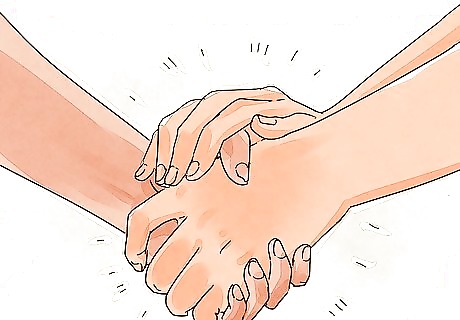
Show your compassion. Sometimes a simple compliment, small favor, or even a smile can make a difference in your life and the life of others. When you are compassionate you can avoid some conflicts and feel good knowing that you are doing what you can to be kind to others. Some evidence suggests that doing nice things for others and being an agreeable person can also help you develop a happy mindset. Help others when you can. Bring in the groceries, hold open a door, or volunteer in your community. Offer someone a compliment. For instance, tell the barista that makes your morning latte that you like her hairstyle when you notice that she’s changed it. Remember to include ways to be continue being compassionate in your plan for your future happiness.
Setting Realistic Goals

Be specific. You can plan for your future happiness if you set goals that are based on your values and that are clear and action-oriented. When your goals are specific you are able to align them with your values and tell whether you have achieved them. For example, setting a goal to ‘be successful’ may be too vague to achieve. What will you be successful at? How will you know when you are successful? A better, more specific, goal might be “Be successful at painting by selling at least five works by the time I’m 72.” Consider setting goals for your top three values. For example, you might set goals for your financial security, social awareness, and education.

Make your goals achievable. Sometimes when planning for your future happiness, you may set goals that are a bit unrealistic. Setting achievable goals not only increases the likelihood that you will achieve them, but also increases your confidence in yourself. When you are planning for your future happiness make sure you are setting goals that challenge you, but that are also achievable. For instance, planning to be a millionaire within the next month when you have $300 in the bank and no sources of income is a specific goal. It may not be realistic, though. Set goals that you can reach with some effort. For instance, planning to graduate at the top of your class when you are in your freshman year may be challenging, but it’s achievable.

Create action steps. Breaking your larger goals into smaller, more concrete action steps will help you achieve them. Action steps are more manageable which may help you stick to your plan better. If, for example, your goal is to join the basketball team by the next season, you might have several action steps. For instance: practice every day, meet with the coaches, and ask for feedback from others. Include as many action steps as you need. The goal is to make it as easy possible for you to reach future happiness. Break your action steps down into individual tasks if you need to. For instance, an action step to practice basketball every day might have the tasks: shooting drills, practice blocking, run for endurance.
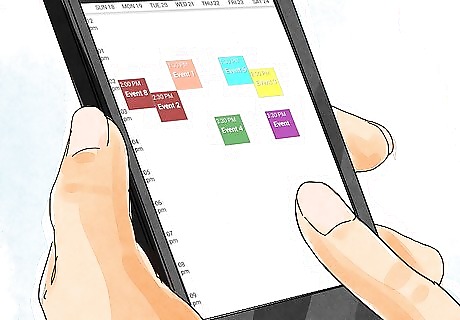
Schedule check-ins and deadlines. Doing this can help you plan for your future happiness in several ways. Check-ins and deadlines can help you evaluate whether you are on track to reach your goals. It can also help by reminding you of what you need to and by holding you accountable to yourself. Use a calendar, agenda, or planner to set deadlines for your tasks, action steps, and goals. You might also consider choosing a 'buddy' to run some of your goals and accomplishments by. Schedule check-ins every few months to make sure that you are sticking with your plan for future happiness.











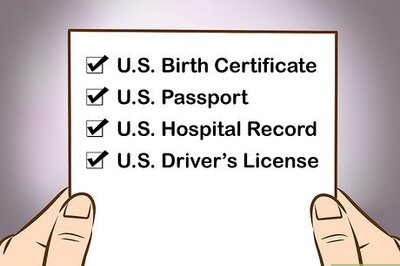







Comments
0 comment